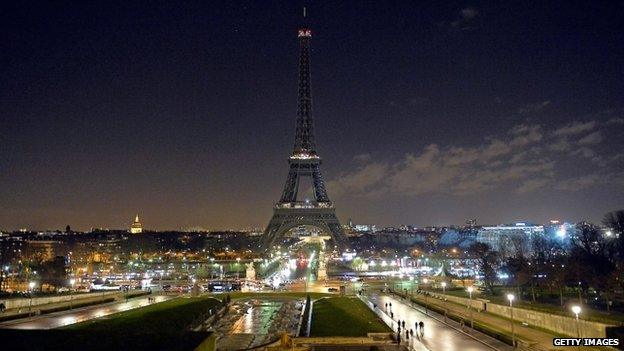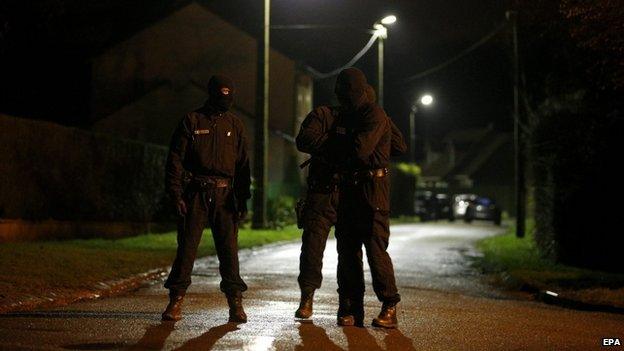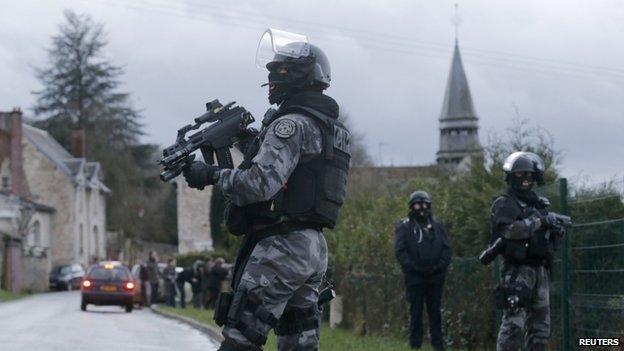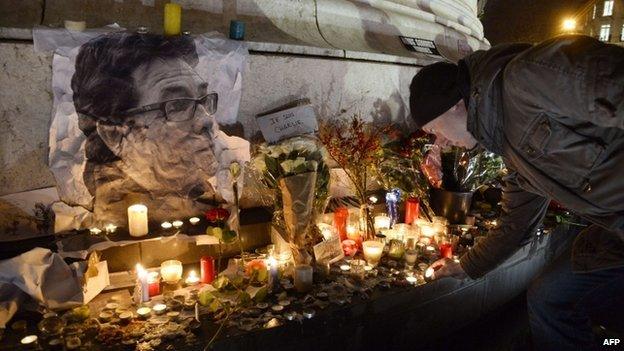Charlie Hebdo attack: Police hunt suspects north of Paris
- Published
Police arrived at a petrol station two hours behind the main suspects, as the BBC's Damian Grammaticas reports
A huge police operation is under way north-east of Paris in the search for the main suspects in Wednesday's deadly attack on Charlie Hebdo magazine.
Officers are searching areas near the town of Villers-Cotterets where the two men reportedly robbed a petrol station.
The village of Longpont was sealed off during house-to-house searches for the brothers, Cherif and Said Kouachi.
France has been marking a rare national day of mourning for the 12 victims of the attack on the magazine in Paris.
Officials say there is no evidence of a link between the Charlie Hebdo attack and a second gun attack on Thursday, in which a policewoman was shot dead in Montrouge, a southern suburb of the capital.
Patrick Pelloux, doctor and Charlie Hebdo contributor, describes the scene of the attack and says "they have not died in vain"
The gunman, armed with a machine-gun and a pistol, fled the attack scene in Montrouge.
Officials have extended the highest security level already in place in Paris to the northern Picardy region as police, including special anti-terror units, continue the manhunt for the Charlie Hebdo attackers. Helicopters flew overhead as they combed the area in the Aisne region.
Interior Minister Bernard Cazeneuve said 88,000 police officers and soldiers had been deployed across France since the attack.
French media reports say police have now pulled out of Longpont after searching the area and woods nearby.

The Eiffel Tower was plunged into darkness as a mark of respect on Thursday night
Meanwhile, vigils for the victims continued across France on Thursday evening. Several thousand people gathered in the Place de la Republique in Paris for a second night, lighting candles and waving signs that read "Je suis Charlie" ("I am Charlie").
At 20:00 (19:00 GMT) the Eiffel Tower turned off in tribute to those killed.
Earlier in the day, a minute's silence was held in public spaces. Twenty imams joined hundreds gathered outside the offices of Charlie Hebdo to express sympathy for the victims.
In New York, the 15 members of the UN Security Council also stood for a moment of silence.
Later, US President Barack Obama made an unannounced visit to the French embassy in Washington to pay his respects.

Charlie Hebdo attack sequence


But elsewhere in France a number of attacks on Muslim targets have been reported, with shots fired at a Muslim prayer hall in the southern region of Aude and a mosque in Poitiers, central France, vandalised.
Mr Cazeneuve said he would not tolerate any act or threat "against a place of worship or any hostile manifestation against French people because of their origin or their religion".
Cherif Kouachi was known to police, as the BBC's Frank Gardner reports
The BBC's Fergal Keane visits the estate where one of the suspected gunmen lived
Two men resembling Cherif and Said Kouachi were spotted at a petrol station in Villers-Cotterets, about 80km (50 miles) north-east of Paris. The station manager described them as heavily armed with Kalashnikovs and rocket-propelled grenade launchers.
They were last seen driving in a Renault Clio car, apparently the same vehicle hijacked in Paris soon after the attack at Charlie Hebdo.
A third man who was initially sought handed himself in to police in the eastern city of Charleville-Meziere late on Wednesday. It is not yet clear if he is regarded as a suspect.

Charlie Hebdo victims

Those killed (from left) include economist Bernard Maris, prominent cartoonists Wolinski and Cabu, Charlie Hebdo editor Stephane Charbonnier and cartoonist Tignous
Economist and regular magazine columnist Bernard Maris, 68, known to readers as Uncle Bernard
Cartoonists Georges Wolinski, 80, and Jean "Cabu" Cabut, 76
Charlie Hebdo editor and cartoonist Stephane "Charb" Charbonnier, 47, who had been living under police protection since receiving death threats
Cartoonists Bernard "Tignous" Verlhac, 57, and Philippe Honore, 73
Mustapha Ourrad, proof-reader
Elsa Cayat, psychoanalyst and columnist, the only woman killed
Michel Renaud, who was visiting from the city of Clermont-Ferrand
Frederic Boisseau, 42, caretaker, who was in the reception area at the time of the attack
Police officers Franck Brinsolaro, who acted as Charb's bodyguard, and Ahmed Merabet, 42, who was shot dead while on the ground

In total nine people connected to the Kouachi brothers have been detained in the towns of Reims and Charleville-Mezieres, as well as in the Paris area, Mr Cazeneuve said.
Cherif Kouachi was sentenced in 2008 to three years in prison for belonging to a group sending jihadist fighters to Iraq.

Security forces blocked roads leading into the village of Longpont

Anti-terrorist police forces also secured the nearby town of Corcy

Rallies are continuing for a second night across France, with vigils staged in honour of the victims
The lawyer for Charlie Hebdo, Richard Malka, said that next week's edition of the magazine would go ahead on Wednesday and would have a print run of one million, instead of the normal 60,000 copies.
Witnesses say the gunmen shouted "We have avenged the Prophet Muhammad" and "God is Great" in Arabic.
The magazine's office was firebombed in 2011. It had angered some Muslims by printing cartoons of the Prophet Muhammad as part of its irreverent take on news and current affairs.
Many cartoonists have been using the "Je suis Charlie" slogan in drawings to commemorate the attack
Politicians and journalists across the globe have widely condemned the Charlie Hebdo shooting as an attack on freedom of speech and the press.
Some European publications on Wednesday re-published the magazine's cartoons, with cartoon tributes also circulating on social media, sending out the message of press freedom.

National Days of Mourning in France
12 November 1970 - Death of former President Charles de Gaulle
6 April 1974 - Death of President Georges Pompidou
11 January 1996 - Death of former President Francois Mitterrand
14 September 2001 - 9/11 attacks on New York and Washington
3 April 2005 - Death of Pope John Paul II
Have you attended or do you plan to attend a vigil? Have you been affected by the issues raised in this story? You can email haveyoursay@bbc.co.uk, external with your experience.
Please include a telephone number if you are willing to be contacted by a BBC journalist.
Send your pictures and videos to yourpics@bbc.co.uk, external or text them to 61124 (UK) or +44 7624 800 100 (international). Or you can upload here, external.